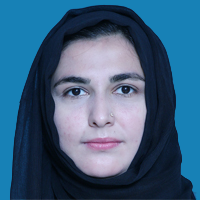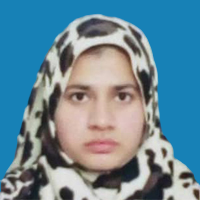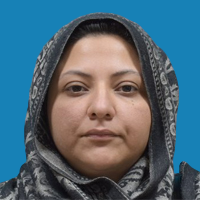
PROFILE SUMMARY
-
Dr. Farah Haneef is a talented professional with a strong academic background and a wealth of software engineering expertise. After receiving an M-Phil in computer science from Quaid-e-Azam University in Islamabad and a BS in computer science from the Arid Agriculture University in Rawalpindi, she obtained her Ph.D. in computer science from Quaid-e-Azam University. She received a gold medal from the University of Arid Agriculture. She is an author of more than ten research publications and currently has a 20.8 Impact Factor. She reviews work for numerous worldwide, peer-reviewed publications. Dr. Farah has worked as a lecturer at several universities. Her notable input to the scholarly world consists of publications, teaching, and research.
| QUALIFICATION | |||
| PhD | Computer Science | Quaid-e-Azam University, Islamabad | 2024 |
| M Phil | Computer Science | Quaid-e-Azam University, Islamabad | 2016 |
| TEACHING EXPERIENCE | |||
| Assistant Professor | Capital University of Science and Technology (CUST), Islamabad. | Since 2024 | |
| RESEARCH AREAS / INTERESTS | |||
| 1. | Algorithm Design and Analysis | ||
| 2. | Software Engineering | ||
| 3. | Machine Learning | ||
| 4. | Social Network Analysis | ||
| SR. | JOURNAL PUBLICATIONS | YEAR |
|---|---|---|
| 1 | F. Waseem, F. Haneef, R. A. Abbasi, M. N. Noor and A. Khalid, “Identifying Significant Factors Associated with Career Selection: A survey based study in Pakistan,” Pakistan Journal of Engineering, Technology and Science, vol. 12, no. 01, pp. 104-116 2024. | 2024 |
| 2 | F. Haneef, “Review of automaton learning algorithms with polynomial complexity–completely solved examples,” arXiv preprint arXiv:2404.11096, 2024. | 2024 |
| 3 | F. Haneef and M. A. Sindhu, “A Reinforcement Learning Based Grammatical Inference Algorithm Using Block-Based Delta Inverse Strategy,” IEEE Access, vol. 11, pp. 12525-12535, 2023. | 2023 |
| 4 | F. Haneef and M. A. Sindhu, “IDLIQ: An Incremental Deterministic Finite Automaton Learning Algorithm Through Inverse Queries for Regular Grammar Inference,” Big Data, 2023. | 2023 |
| 5 | F. Haneef and M. A. Sindhu, “DLIQ: A Deterministic Finite Automaton Learning Algorithm Through Inverse Queries,” Information Technology and Control, vol. 51, no. 4, pp. 611-624, 2022. | 2022 |
| 6 | M. N. Noor and F. Haneef, “Machine Learning Model to Predict Automated Testing Adoption,” International Journal of Software Innovation (IJSI), vol. 10, no. 1, pp. 1-15, 2022. | 2022 |
| 7 | M. N. Noor and F. Haneef, “Threat of crimes related to robbery during covid-19: special focus on Pakistan (preprint),” 2021. | 2021 |
| 8 | F. Haneef, et al., “Using network science to understand the link between subjects and professions,” Computers in Human Behavior, vol. 106, p. 106228, 2020. | 2020 |
| 9 | F. Haneef, et al., “A Review of Career Selection Models,” Research-pedia Journal of Computing, vol. 1, no. 1, 2020 | 2020 |
| 10 | M. N. Noor and F. Haneef, “A Review on Big Data and Social Network Analytics Techniques,”Research-pedia Journal of Computing, vol. 1, no. 1, pp. 39-49, 2020. | 2020 |
| 11 | F. Waseem, F. Haneef, M. N. Noor, A. Khalid, H. Rashid, and Q. Yousaf, “A review based on active research areas in mining software bug repositories: Limitations and possible future trends.” International Journal of Innovations in Science & Technology, Vol. 6, no. 3, pp 1249-1266, 2024. | 2024 |
| SR. | CONFERENCE PUBLICATIONS | |
|---|---|---|
| 1 | Noor, M. N., Nazir, M., Dilshad, V., and Haneef, F., “A Framework for Multi-Grade Classification of Ulcerative Colitics using Deep Neural Networks,” in Proc. 25th IEEE Int. Multi Topic Conf., 2023 | 2023 |
Other Members

Mr. Suleman Khan

Engr. Abdullah

Nayab Tariq

Mr. Muhammad Waqas

Ms. Arooba Sadaqat

Zohaib Ahmed

Mr. Imran Javed

Ms. Hira Firdous

Ms. Asma Qandeel

Ms. Rimsha Jahangir

Mr. M. Wasim Haider

Ms. Zahida Younas

Mr. Furqan Ahmad

Ms. Aqsa Hussain Raja

Ms. Rokhma Un Nisa

Syed Farhan Ali

Ms. Jaweria Khalid

Mr. Hussain Sallar

Engr. Kiran Rashid

Ms. Faryal Hayat

Ms. Tehreem Ahmed

Ms. Qurat-ul-Ain Zeb

Mr. Manan Shahid

Ms. Anam Zahra

Ms. Zuha Raza

Ms. Asma Ali

Mr. Muhammad Zohaib Khan

Mr. Hamza Naveed

Mr. Muhammad Daniyal

Mr. Ibtisam Zia

Ms. Sadaf Adalat

Dr. Anum Rashid

Dr. Nosher Wan Khan

Dr. Iftikhar Ali Janjua

Mr. Rafah Ahmed

Ms. Fatima Khurshid

Hamza Ishaq

Ms. Asia Shahab

Ms. Samra Naseer

Ms. Mahin Malik

Mr. Muhammad Awais

Ms. Samar Fatima

Mr. Islam Ud Din

Mr. Imran Ul Haq

Mr. Temour Abbas

Ms. Iqra Javed

Mr. Qazi Shuja Ud Din

Ms. Asma Rauf

Ms. Amina Ashfaq

Ms. Uzma Shaheen

Ms. Syeda Hafsa Ali

Mr. Tabarak Matloob

Mr. Adnan Karamat

Ms. Ayesha Amjid

Ms. Sabahat Asad

Ms. Saba Nawaz

Ms. Hina Rashid

Ms. Khizra Bibi

Mr. Wasif Ali

Ms. Anum Naseem

Mr. M. Danish

Mr. M. Majid Zaman

Mr. Taimoor Riaz

Ms. Itrat Fatima

Mr. Zaheer Ahmad

Ms. Qudsia Yousaf

Ms. Nadia Ashfaq

Mr. Mudassar Adeel

Mr. Syed Awais Haider

Mr. Ibrar Arshad

Ms. Sadia Rasheed

Dr. Saifullah

Dr. Sabeen Masood

Dr. M. Furqan

Dr. Aamer Nadeem

Mr. M. Ibrar Khan

Dr. Nadeem Anjum

Mr. S. Hassam Ali Sami

Mr. Abdul Haseeb

Ms. Mamoona Bilal

M. Junaid Tariq

Ms. Snober Naseer

Mr. Sajeel Ahmad

Fouzia Qureshi

Ms. Rida Haya

Mr. Israr Ahmad Sani

Hina Shoaib

Ms. Yafra Khan

Fizza Asif

Ms. Rubina Shoukat

Mr. Shamas Gulfam

Mr. M. Zeeshan Sabir

Ms. Rabea Saleem

Ms. Rifhat Hashim

Mr. Salman Ahmed

Dr. Bilal Ahmad

Ms. Farwa Tahir

Ms. Farwa Zaid Ali

Mr. Fahim Shahzad

Dr. S. Saqib Raza Rizvi

Ms. Fareeha Hasan

Dr. M. Siraj Rathore

Ms. Asima Bibi

Ms. Fiza Tahir

Ms. Sabiha Naureen

Ms. Hafsa Jabeen

Dr. Muhammad Riaz

Mr. Mateen Abbas

Ms. Komal Farooq

Dr. Amir Qayyum

Dr. Nayyer Masood

Mr. Ahsan Rafiq

Dr. M. Masroor Ahmed

Dr. M Abdul Qadir

Mr. Sadaqat Hussain

Mr. M. Farhan Ali Khan

Mr. Sohail Riaz

Ms. Nitasha Gohar

Mr. Muhammad Yasir

Ms. Iqra Hamid

Dr. Muhammad Saalim

Dr. Farman Ullah Khan

Dr. Siraj Khan

Dr. Reem

Dr. Mahira Zeeshan

Dr. Fazlullah Khan

Dr. Nadia Shamshad

Dr. Mahboob Alam

Dr. Muzaffar Abbas

Ms. Sania Tabassum

Ms. Taliha Ahmed

Ms. Ayesha Aftab

Ms. Shah Gull

Mr. Irfan Zafar

Dr. Sami Ullah Jan

Dr. M. Asad Anwar

Dr. Sania Riaz

Dr. Rizwan Ur Rehman

Dr. Sohail Ahmad Jan

Dr. Arshia Amin Butt

Dr. Erum Dilshad

Dr. Shaukat Iqbal

Dr. S. Marriam Bakhtiar

Dr. Sahar Fazal

Mr. Sikandar Seemab

Ms. Farrah Iqbal

Mr. M. Aneeb Fazal

Ms. Faiza Arshad

Ms. Asma Naz

Mr. Maqsood Alam

Ms. Naveeda Fazal Haq

Ms. Uzma Arshad

Ms. Saeeda Ibrahim

Mr. Inam Elahi

Dr. M. Saqib Zaigham

Dr. M. Umar Farooq

Mr. Imad-ud-Din

Ms. Javeria Khalid

Mr. M. Irfan Mustafa

Ms. Sarah Nawaz

Mr. Faraz Ali Shah

Mr. Hafiz M. Adnan

Mr. M. Umar Toor

Ms. Rabia Habib

Dr. S. Arslan Haider

Dr. Arif ud din

Dr. Shakeel Iqbal

Dr. Maria Mashkoor

Dr. M. Saboor Ahmed

Mr. Nasir Rasool

Dr. Ahsan M. Ahmed

Dr. Robina Yasmin

Dr. Imran Riaz Malik

Dr. Shazia Faiz

Dr. M. Ishfaq Khan

Dr. Ansir Ali Rajput

Mr. Saqib Naveed

Dr. S. M. Mehdi Raza

Dr. Arshad Hassan

Engr. Sarmad Ali

Engr. M. Ahmed

Mr. M. Haroon

Mr. M. Zulfiqar

Mr. M. Rizwan Siddiqui

Mr. Manzar Masud

Mr. Tauseef Ahmed

Dr. Shummaila Rasheed

Dr. Ghulam Asghar

Mr. Khalid Mahmood

Mr. Syed Hassan Shah

Mr. Saif Ullah

Dr. Muhammad Irfan

Dr. M. Mahabat Khan

Mr. Muneeb Ahmed

Engr. M. Arslan Rafique

Mr. Yasir Hussain

Mr. Ahmed Ali

Ms. Samra Ghaffar

Mr. Abdullah Numani

Ms. Tooba Masood

Engr. Amir Habib

Mr. Moin Qasim

M. Ehtisham Hassan

Mr. Umar Maqbool

Dr. Touseef Javed

Dr. Umer Farooq Ahmed

Dr. Waseem Abbass

Dr. Muhammad Riaz

Dr. M. Ashraf

Dr. Fazal-ur-Rahman

Dr. Noor M. Khan

Dr. Imtiaz Ahmad Taj

Dr. M. Mansoor Ahmed

Mr. Muhammad Yahya

Mr. Muhammad Faran

Mr. Minhas Shah

Mr. Talha Ahmed

Mr. Sohail Afzal

Mr. M. Waqas Malik

Mr. Shaheed Ullah

Mr. Talha Bin Tahir

Mr. Iqbal Ahmad

Ms. Faiza Khalid

Dr. Maria Ghufran

Dr. M. Usman Farooqi

Dr. Ishtiaq Hassan

Dr. Majid Ali

Ms. Rida Rafaqat

Mr. Waqar Younas

Mr. Azhar Rauf Khan

Mr. M. Nauman

Mr. Muhammad Iqbal

Mr. Naveed Ahmed

Ms. Ayyesha Kanwal

Ms. Zuriat Zahra

Mr. Naeemullah Khan

Dr. Abid Kamran

Dr. Samina Batul

Dr. Dur e Shehwar

Dr. M. Sabeel Khan

Dr. A. Rehman Kashif

Dr. Rashid Ali

Dr. Muhammad Sagheer

Ms. Tehmina Mazhar

Ms. Iqra Kiran

Ms. Asima Munawar

Ms. Anam Mehmood

Ms. Aysha Aneeq

Ms. Irum Noureen

Ms. Uzma Mushtaq

Mr. M. Zeeshan Iltaf

Ms. Sadaf Zeb

Dr. Uzma Rani

Dr. Ishrat Yousaf

Dr. Sabahat Haqqani

Dr. Anam Tariq

Dr. Zeeshan Ahmed

Dr. Jaleel Ahmed Malik

